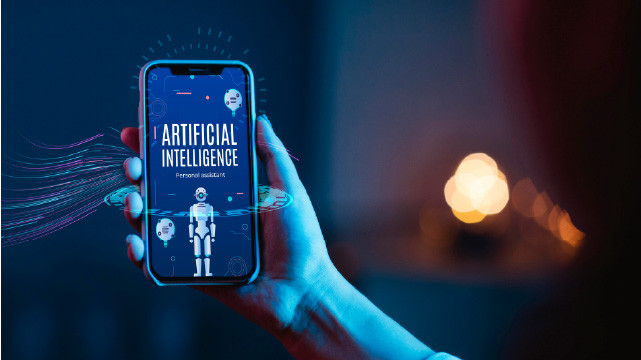What to expect from an AI-powered smartphone?
With the development of artificial intelligence (AI), smartphones promise to become smarter, more useful and bring users completely new experiences.
The integration of AI technology into smartphones has revolutionized the mobile industry, enhancing the user experience and enabling a range of smart features. Looking ahead, AI promises to bring even more advanced capabilities to our handheld devices. So, what can users expect from AI-enabled smartphones in the coming years?

1. Provide advanced virtual assistants
Advanced virtual assistantis the next generation of virtual assistants, equipped with more advanced AI and higher learning and adaptability than current virtual assistants such as Siri, Google Assistant and Alexa.
The integration of AI in smartphones will include intelligent virtual assistants that are able to predict user needs with high accuracy. These virtual assistants will not only carry out commands but also predict the user's next move to provide more unique services.
Some of the key features of the advanced virtual assistant include:
Warn or suggest before the user even knows they want or need help:This is the ability to anticipate a user's needs. Advanced virtual assistants will analyze the user's context, habits, and behavior to make suggestions or alerts before the user even realizes they need it. For example, if you often order coffee in the morning, your virtual assistant can notify you that your favorite coffee shop is having a promotion.
Understand the contextual expression of a complex command:This involves the virtual assistant’s enhanced ability to understand context. It understands not just individual words, but also the overall meaning of the command, including the context and intent of the user. For example, if you say “I need information on healthy recipes for dinner,” the virtual assistant will understand that you don’t just want to find recipes, but also want to find recipes that fit a healthy diet for dinner.
Security and safety from hacker attacks:This is a major concern for advanced virtual assistants, as they collect a large amount of data about their users. To ensure safety, virtual assistants need to have advanced security features, such as data encryption and multi-factor authentication. Additionally, developers need to regularly update virtual assistant software to patch security vulnerabilities.
2. Advanced camera integration
Smartphones today already incorporate advanced AI-powered photography features, such as scene recognition, portrait mode, and low-light enhancement. The ultimate goal is for AI to deliver professional-quality photos at affordable prices.
Future AI advancements will continue to unlock more advanced and sophisticated camera features for every user, including:
Temporarily recognize scenes and objects:This is the ability to temporarily identify scenes and objects in a frame. AI will analyze images in real time to understand the context and objects that appear in them. For example, AI can recognize seascapes, human portraits, or food on a table.
Automatic adjustment for best image quality:Based on the temporary recognition of scenes and objects, AI can automatically adjust camera parameters to achieve the best image quality. For example, if AI recognizes a seascape, it can increase color saturation to highlight the blue of the sea. Or if AI recognizes a human portrait, it can adjust exposure and focus to achieve a clear and beautiful image.
Advances in optics enable better augmented reality (AR) experiences:This has to do with the camera hardware. Advances in optics, such as higher-quality lenses and better image sensors, will allow cameras to capture more data and produce more accurate images. This is essential for AR to work effectively, as it needs to seamlessly and accurately superimpose virtual objects on the real world.
3. Advanced security features
In the future, with the support of AI, mobile security will become a top concern for every smartphone user. Therefore, the next generation of AI-integrated smartphones will integrate advanced security features, including:
Biometric authentication:This is a method of authenticating users based on each person's unique biological characteristics, such as fingerprints, faces, irises, etc. Biometric authentication is considered more secure than traditional passwords.
Threat Detection:AI can analyze user data and activities to detect cybersecurity threats, such as malware, online scams, etc. When a threat is detected, AI can alert users or automatically take protective measures.
User-friendly security measures:AI can learn from a user's phone usage habits to suggest appropriate security measures. For example, if a user frequently accesses public Wi-Fi networks, AI can suggest using a virtual private network (VPN) to protect personal data.
4. Personalized user experience
In addition to improving virtual assistants, AI will help smartphones personalize according to user preferences, making using the phone more intuitive. This includes many aspects, from selecting and recommending the most suitable applications for users to having an interface that can change or transform depending on how each person uses the application, specifically:
Application recommendation:Based on a user's phone usage habits, AI can suggest new apps that the user might be interested in. For example, if you often read online newspapers, AI can suggest other newspaper reading apps or news apps that are tailored to your interests.
Personalize the interface:The interface of some apps can change based on how you use it. For example, if you frequently use a particular feature in an app, the AI can rearrange the interface to make that feature easier to access.
Demand forecasting:AI can learn from users' habits to predict their needs and provide tailored services. For example, if you often order food at lunchtime, AI can automatically open the food ordering app around that time.
Overall, personalized user experience is one of the main benefits of using AI in smartphones. It saves users time, effort, and makes using the phone more comfortable and efficient.
5. More efficient battery management
Battery life is considered one of the most important functions of a smartphone. AI will be helpful in managing the battery more efficiently as it can monitor the user's usage habits and adjust power consumption accordingly.
This will not only help extend battery life but also improve the overall performance of the device. Specifically, AI can perform the following tasks to better manage the battery:
Track user behavior:AI can analyze how you use your smartphone, including the apps you use most, how long you use them, and the tasks you perform frequently.
Adjust power consumption:Based on user behavior, AI can adjust the power consumption of different components in a smartphone. For example, AI can reduce the speed of the central processing unit (CPU) or reduce the screen brightness when you are not using the phone.
Optimize application performance:AI can help optimize the performance of apps, making them run smoother and consume less battery.
Demand forecasting:AI can predict your future battery needs and take steps to conserve battery. For example, if you know you're going to be out all day and won't be able to charge your phone, AI can automatically activate battery-saving mode.
6. Provides a smoother multitasking experience
Future AI-enabled smartphones will offer improved multitasking capabilities, allowing users to switch between apps and tasks more efficiently. AI will manage background processes, allocate resources, and deliver a smoother multitasking experience.
Specifically, AI can do the following to improve the multitasking experience:
Manage background processes:AI will monitor background running apps and automatically close or pause unnecessary apps, saving resources and improving overall performance.
Resource allocation:AI will intelligently allocate system resources (such as RAM, CPU) to running applications, ensuring that the main application in use is prioritized in terms of performance.
Demand forecasting:AI can learn from user behavior to predict which app the user is likely to use next. This way, AI can preload part of that app, making switching between apps faster.
Keep application state:When a user switches to another app, AI can save the current state of that app (e.g., the text being drafted), making it easy for the user to continue working when returning to the app.
With the help of AI, smartphone users of the future will be able to switch between apps without worrying about lag or data loss. The smooth multitasking experience will help users work more efficiently and get the most out of their smartphones.
7. Health care monitoring and support
AI will improve health monitoring and healthcare support features on smartphones, providing more accurate and comprehensive tracking of various health indicators. Future devices will provide personalized health insights and recommendations based on continuous monitoring.
Specifically, AI can help monitor health and support healthcare in the following ways:
Accurately track health metrics:AI-enabled smartphones can incorporate advanced sensors to monitor important health metrics like heart rate, blood pressure, blood oxygen levels, sleep, etc. AI will analyze this data to provide users with accurate and detailed information about their health status.
Continuous monitoring:AI can monitor a user's health 24/7, even if they don't actively activate the tracking feature. This allows AI to detect small changes in health over time and alert the user if necessary.
Analyze data and make suggestions:AI can analyze a user's health data and make personalized suggestions to improve overall health. For example, AI can recommend appropriate exercise routines based on a user's health status and fitness goals, or suggest dietary changes to improve sleep.
Connection with other medical devices:AI-enabled smartphones can connect with other medical devices, such as blood glucose meters or blood pressure monitors, to collect additional data and give users a more complete picture of their health status.
With the help of AI, smartphones in the future can become a useful tool for health monitoring and supporting personal health care. However, it is important to note that smartphones cannot replace medical professionals. Users should consult a doctor before making any decisions related to their health.
According to the forecast of the prestigious market analysis company Canalys, headquartered in Singapore, the number of AI-integrated smartphones will account for 54% of the global market by 2028, a sharp increase compared to 16% in 2024.
In addition, Canalys said that the AI-integrated smartphone segment is growing at a compound annual growth rate (CAGR) of 63% during the period 2023-2028. This growth is driven by consumer demand for advanced features such as AI virtual assistants and on-device processing capabilities. This transition is expected to occur first in flagship smartphones, then gradually apply to mid-range phones.
According to Canalys, global smartphone giants such as Apple, Google, Samsung, along with leading Chinese manufacturers such as Honor, Oppo, Xiaomi and Vivo are at the forefront of integrating AI features into their devices.





